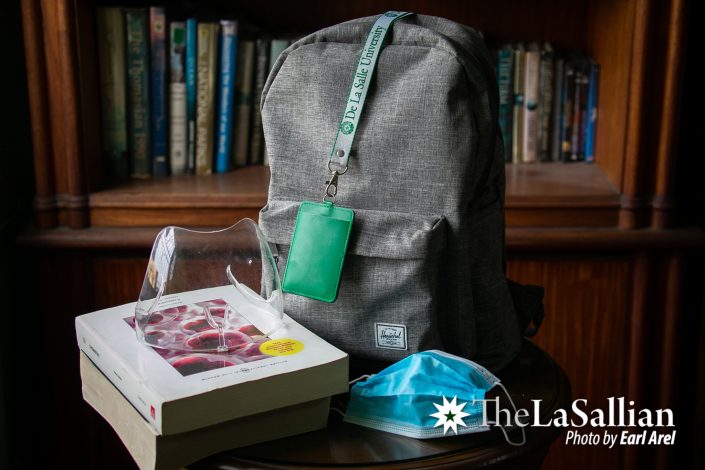De La Salle Philippines (DLSP) hosted the Safe La Salle 2022 webinar last February 18 via Zoom and Facebook Live with the theme, “Pandemic Reflections for the Future of the Lasallian Education Mission”.
The event had three sessions which discussed the recent surge in COVID-19 cases worldwide, the effect of these surges on the resumption of face-to-face classes, and how universities have handled the transition to an online learning setup.
In his opening remarks, DLSP President Edgar O. Chua stated that since the start of the pandemic, “a lot has happened in the educational field.” Br. Edmundo Fernandez FSC, superintendent of DLSP, further emphasized Chua’s message, citing that out of the only five countries that have yet to open schools last year, the Philippines is one of them.

Health’s strength and protection
Dr. Guido David, an OCTA research fellow and a professor at the University of the Philippines Diliman, first discussed the current COVID-19 variants of concern: the Alpha, Beta, Delta, Gamma, and Omicron variants.
In the subsequent portion of his presentation, David introduced the concept of the reproduction number—an important indicator that gives an estimate of the number of infections caused by one infected individual. This could then give a sense of the rate of infection; the higher the reproduction number, the faster COVID-19 spreads. Thus, in order to contain COVID-19, the reproduction number must be brought down, preferably below one.
David also tackled the concept of herd immunity, or what he called “population immunity”, mentioning that 60 percent of the Philippines’ population needs to be vaccinated to “protect everybody else.” He elaborated that, in this case, the rest of the populace does not need to be vaccinated because of the protection that herd immunity offers.
“We believe that natural immunity through vaccination will be developed to improve population immunity,” David posited. He also expounded that there is the possibility of moving to a “new” normal, and there is a strong possibility that face-to-face classes will resume soon.
Terence Tiu, vice president for administration of De La Salle-College of St. Benilde, then presented his plan, the Back-to-Benilde Timeline, which aims to direct the planning, implementation, monitoring, and evaluation of limited face-to-face classes and access to campus facilities.
Atty. Joseph Noel Estrada, managing director of the Coordinating Council of the Private Educational Associations of the Philippines, also tackled vaccination and COVID-19 testing requirements, as well as the Social Security System Benefit Program and the Philippine Health Insurance Corporation COVID-19 Home Isolation Benefit Package.
Prior to the recent surge in January of this year, COVID-19 tests are only required for unvaccinated employees. However, they must not be forced into the vaccination process. “We have to respect the decision of our employees,” Estrada mentioned.
However, requirements in the transition back to face-to-face classes necessitate that students and employees be vaccinated, undergo COVID-19 testing, and have healthcare insurance.
‘Build back better’
Plans and experiences in conducting a safe integration of face-to-face classes were also discussed by various members of the academe.
“The challenge is usually in not knowing what to do,” Ateneo Institute for the Science and Art of Learning and Teaching Director Galvin Ngo pointed out.
With this, Ngo proposed four models that are ideal for the near future: blended learning, online plus, hybrid, and flex learning. While blended learning and online plus cater to either fully in-person or fully online setups, hybrid and flex learning make use of an integration of both setups. He said that while these models may be the ideal plan to follow, there are still many different ways that these could be accomplished.
Ngo further stressed that education prior to the pandemic only considered on-site technology, meanwhile, flex or hybrid models allow educational institutions to “work with various combinations” that could better maximize the available resources.
Fulfilling these models are both Vice Chancellor for Academics of De La Salle Medical and Health Sciences Institute (DLSMHSI) Dr. Juanito Cabianas and Vice Principal of St. Joseph’s Institution – Singapore Dominic Ang.
Cabianas shared that through various consultations with students, parents, and stakeholders, their campus was able to obtain the necessary permit provided by the Commission on Higher Education (CHED) for in-person classes.
While the campus still follows the limits set by CHED, Cabianas is positive that this is the beginning of the “brighter side of the uncertain future.” Ang likened their institution’s staggered return to a face-to-face setup, and explained that priorities were given first to the social-emotional well-being of the students and faculty.
Ultimately, Ngo, Cabianas, and Ang stressed the importance and necessity of constant communication between the student and faculty body. All agree that the integration of both in-person and online delivery of classes cannot be done without the proper coordination of affected stakeholders.
“Take a look at the people’s perspective. This is crucial because as we’ve seen mental health is a big factor…Take a look at the stakeholders first and how they’re able to handle the best models,” Ngo ended.
